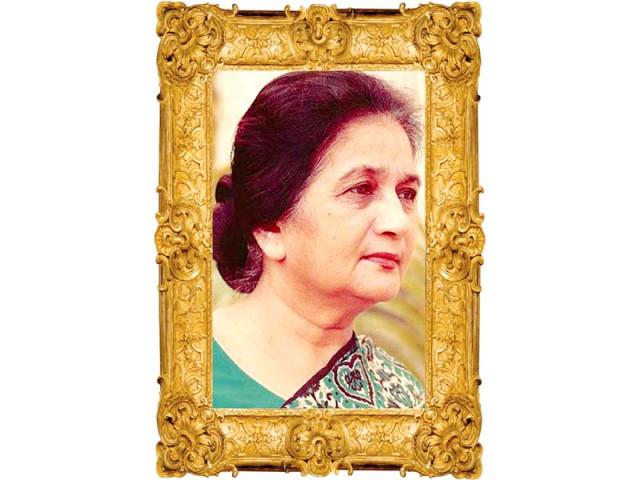Rest in peace Ada leaves her name on everyone’s lips
First woman to have her diwan ‘Main Saaz Dhoondti Rahi’ published in India and Pakistan garnered cult male...

Ada stood out because she focused on the broader spectrum of progressive thought rather than playing it safe. PHOTO: PUBLICITY
“Hamare sheher ke logon ka ab ehwaal itna hai, kabhi akhbaar parh lena, kabhi akhbaar hojana.” After shining for 91 years in a male-dominated trade, Ada Jaferey breathed her last on Friday, March 13. Born as Aziz Jehan in the Indian city of poets, Badayoon, on August 24, 1924, she had freed herself from societal and traditional shackles at the age of 12, and began to write under the pen name Ada Badayooni.
Having not received formal education, Ada’s poetic endeavours were more instinctive and less engineered. Under the guidance of Asar Lucknowi and Akhtar Shairani, Ada grew both as a litterateur and torchbearer of feminine representation in the world of Urdu literature. “My poetry is the expression of the helplessness of our women. In a society where women have limited franchise, even my protest isn’t loud enough – I never intended to upset the system,” she once wrote.
What set Ada apart from her contemporaries is that she focused on the broader spectrum of progressive thought rather than playing it safe, a trait present-day poet Fatima Hassan believes stood-out throughout Ada’s illustrious career. “She never played it safe and testament to this is that she entered the male-dominated poets’ corner and didn’t refrain from expressing herself,” Fatima told The Express Tribune. She feels that neither was Ada preceded by a female Urdu poet, who garnered the level of glory a male poet would, nor by any who developed a major following among male readers. “She broke that glass ceiling,” she said, stating that even her autobiography was no less than a masterpiece.

She married Noorul Hasan Jafri on January 29, 1947, and subsequently adopted the pen name that the world now recognises her for. Ada considered her husband as the driving force behind the fearless subjective expressionism, which is vivid in her poetry. Her ideologue is an amalgam of classical Urdu traditions, individual imagination and socio-political movements. Writer S H Jafri, Ada’s brother-in-law, shared, “I was only eight when she married my older brother. She played a pivotal role in my intellectual development and I owe a lot to her.
“She was the first woman to get her diwan, Main Saaz Dhoondti Rahi, published in India and Pakistan,” recalled satirist Anwar Maqsood. “Her staunch followers include Parveen Shakir, Zehra Nigah and Kishwar Naheed,” he added. Nigah concurs, “We were together for years. She bridged a path for us, the young poets of that era, to be able to pen our thoughts. I pray she is able to get a better place in the hereafter,” she stated.

Ada published nine books, with the last of her works seeing the light of day in 1995. Apart from numerous other laurels she received in recognition of her services, the Government of Pakistan awarded her with Tamgha-e-Imtiaz in 1981.
Back in the day, only seasoned poets were given airtime on PTV, but Ada’s work was noticed despite her not being a brand name. Her claim to fame was her ghazal ‘Honton Pe Kabhi Unke Mera Naam Hee Aye’, sung and popularised by Ustad Amanat Ali Khan. Becoming an instant hit, the ghazal was repeatedly played on PTV and Radio Pakistan, and brought Ada to the fore.
Singer Shafqat Amanat Ali remembers his father Khan saying to him as a child, “I have returned today after signing a ghazal, which will not be forgotten easily.” He added, “The greatest strength of Ada’s work was that she could express complex ideas in simple terms. My personal favourite verse from the ghazal is, ‘Taaron se saja lenge raah-e-sheher-e-tamanna/Maqdoor nahi subha chalo shaam hee aye’.”
Ghazal singer Salman Alvi, who was related to Ada, deems her to be an institution. “She was a school in herself. I was still a kid when her ghazal ‘Honton Pe Kabhi Unke Mera Naam Hee Aye’ came in the limelight and became famous,” he shared. Writer and scholar Dr S M Moeen Qureshi said her personality has had a perennial impact on our literary tradition and will continue to inspire for years to come.
Published in The Express Tribune, March 15th, 2015.
Like Life & Style on Facebook, follow @ETLifeandStyle on Twitter for the latest in fashion, gossip and entertainment.



1724319076-0/Untitled-design-(5)1724319076-0-208x130.webp)















COMMENTS
Comments are moderated and generally will be posted if they are on-topic and not abusive.
For more information, please see our Comments FAQ